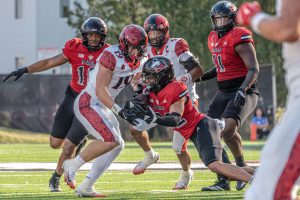A credit to the future
February 20, 2004
Open meetings regarding reaccreditation of the university will be held Monday and Tuesday for students, faculty and staff to voice their opinions.
The meetings, which will be held by the Higher Learning Commission, are one of the final phases of the reaccreditation process.
“This process will help us determine where to go in the next 10 years,” NIU President John Peters said. “I think we will be overwhelmingly reaccredited.”
Accreditation certifies that colleges and universities provide an acceptable institutional quality and incentive for self-improvement.
According to the Higher Learning Commission, for an institution to be accredited, it must have a clear and publicly stated purpose that is appropriate for an institution of higher learning, effectively organize its resources to accomplish its purposes, continue to strengthen its educational effectiveness and demonstrate integrity in its practices and relationships.
The Higher Learning Commission is part of the North Central Association of Colleges and Schools, the group that accredits NIU. NIU has been accredited through the NCA since 1915.
Standard evaluation is for a 10-year period, which is the maximum amount of time the federal government allows accreditation to remain in effect without another review, said Robert Appleson, associate director of the Higher Learning Commission.
“There are always concerns,” Appleson said. “But none have been considered serious enough to move up NIU’s visit date.”
Members of the review team are chosen from a 19-state region that the NCA services, but they are not allowed to work for the schools they visit, said Virginia Cassidy, associate vice provost for Academic Planning and Development. Usually, members also are not allowed to work in the same state as the one they are visiting, Cassidy said.
The review team is made up of administrators and faculty from other schools that specialize in various fields such as fine arts, finance, business discipline, mathematics, physical sciences, political sciences and health services, Appleson said.
“The team is asked how the institution has dealt with previous recommendations by the last visit team,” Appleson said.
During the last commission visit in 1994, some concerns were raised about the upkeep of campus buildings and compliance with the American Disabilities Act, Cassidy said.
“We got a good start on architecture, and they will be impressed with our progress,” Peters said. “But the budget has really slowed our progress – not stopped it but slowed it.”
Other areas the review team will focus on are enrollment management and the programs offered at NIU, Peters said.
“NIU is a doctoral and research-intensive university,” Peters said. “I think they will tell us to focus on our areas of excellence and ask us what areas we will focus on.”






